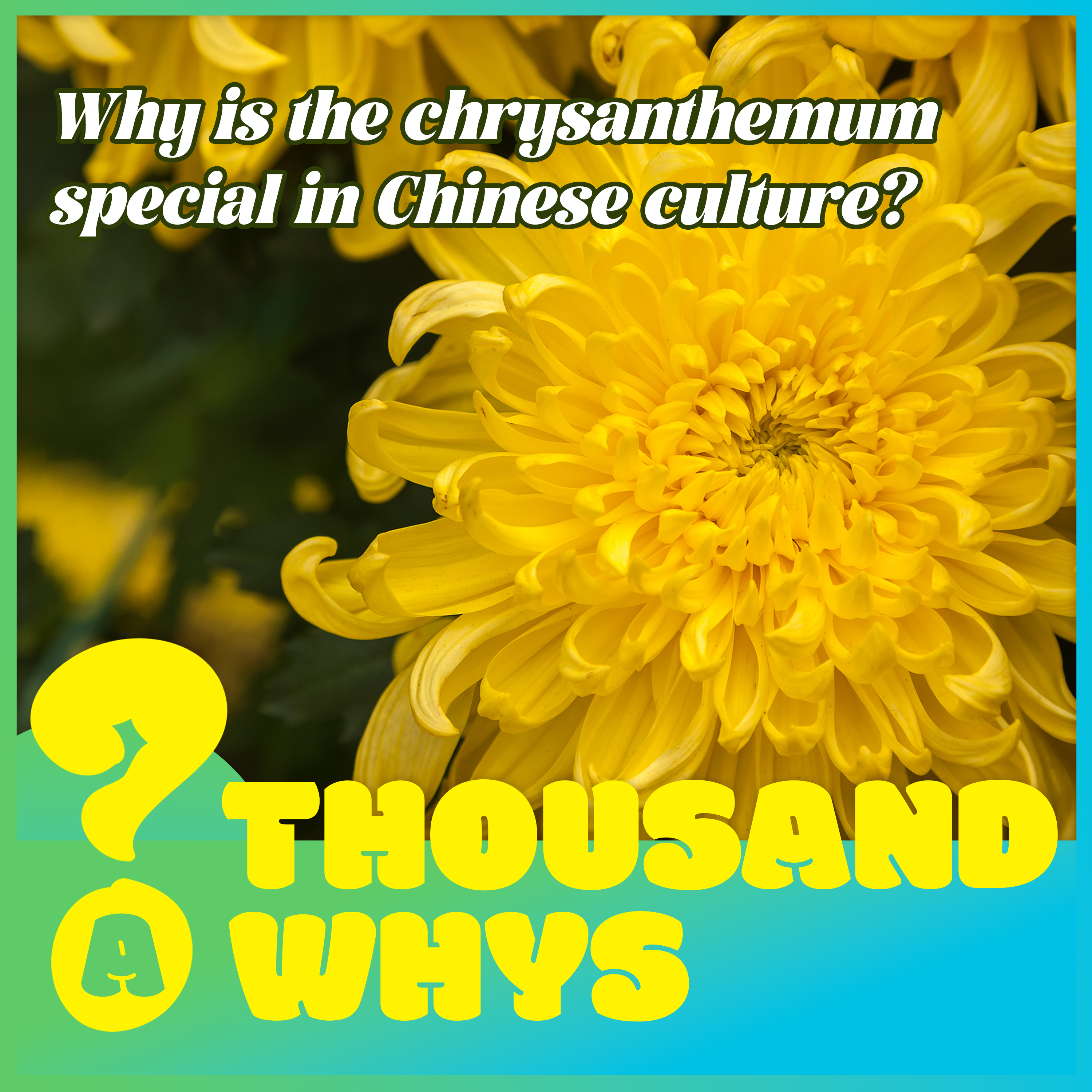
Why is the chrysanthemum special in Chinese culture?

A Thousand Whys
Deep Dive
- Chrysanthemums are among China's top 10 flowers.
- They bloom from September to November.
- The Double Ninth Festival celebrates longevity, coinciding with the chrysanthemum's peak bloom.
- Drinking chrysanthemum wine is a festival tradition.
Shownotes Transcript
What's one of the must-do's when it comes to appreciating the beauty of autumn? For many Chinese, admiring the chrysanthemums comes at the top. Welcome to this episode of A Thousand Ways, I'm Niu Honglin. In this episode, we'll explore the significant role that chrysanthemums hold in Chinese culture.
The chrysanthemum flower is one of China's top 10 famous flowers with over 3,000 years of cultivation history. Their bloom period often spans from September to November each year and they dazzle the season with a rich array of colors, ranging from yellow, white, purple and red to multiple hues in a single flower.
Chrysanthemums are more than just a pretty sight. The flower is closely associated with the Double Ninth Festival, or 重阳节 in Chinese, celebrated on the ninth day of the ninth month on the traditional Chinese lunar calendar.
In Chinese, number nine sounds the same as "a long time," which symbolizes longevity. So, the festival is imbued with the good wish of longevity. As the chrysanthemums are long regarded as the flower of longevity, and the festival coincides with their peak blooming season, admiring the flower and drinking chrysanthemum wine have become cherished traditions of this festival.
Now, let me share with you a story about chrysanthemums. Once upon a time, there was a scholar named Fan Juqing who fell seriously ill when traveling to the capital for his imperial exam. The innkeeper, fearing that Fan might have contracted a contagious disease, isolated him in a guest room and dared not call for a doctor.
One autumn evening, another scholar named Zheng Xiao who was staying at the same inn heard someone crying out in pain when he was studying. Concerned, he approached the innkeeper to inquire. Do you know who's making that noise? That's a Sikh scholar. We're afraid he has a contagious illness, so no one dares to visit him. How do you know it's contagious without diagnosing him first?
I happen to know some medicine. Let me go take a look. Please don't. What if it's contagious? It could ruin your chance at the exam in the capital. Life and death are in the hands of fate. I have made up my mind, and there's no need to dissuade me. With that, Zhang Shao took some medicine and went into Fan Juqing's room. He found Fan lying on the bed, pale and emaciated, barely conscious.
he immediately asked the innkeeper to bring some porridge and fed it to Fan bit by bit. After checking Fan's pulse, he also administered some medicine. Don't worry, I'll do my best to heal you. With Zhang's attentive care, Fan Juqing recovered in a few days' time. But the bad news is, both missed the exam because of the illness.
Upon hearing this, Fan Juqing plucked a blooming chrysanthemum from the roadside and handed it to Zhang Xiao.
Deal.
So, the two became swarm brothers and returned to their respective homes. On the ninth day of the ninth month in the following year, Zhang Shao got up early to clean his house. He placed a bouquet of chrysanthemums in a vase, prepared a lavish meal, and waited for Fan Juqing's arrival.
There's no need to rush. We can prepare the food once your brother arrives. But Zhang Shao insisted on waiting from morning till night, but Fan Juqing didn't show up. Perhaps the journey was long, and he lost track of time. Why don't you go rest for now? I believe he will keep his word. I'll stay up and wait for him a bit longer. You can go ahead and rest. Alright.
In the middle of the night, Zhang Shao finally heard the sound of footsteps. He hurried to open the door and found Fan Juqing arriving at last. Brother Zhang, sorry to keep you waiting. I hurried here all the way. No worries. I have some food and drinks ready. We must have a good chat.
And so, on that autumn night, the two men had a long chat in the moonlight and caught up on their lives over the past year while admiring the chrysanthemums. Throughout history, chrysanthemums have been cherished by scholars and poets for their resilience against frost and their pure, lofty spirit.
Blooming in the chill of late autumn, they stand tall while other flowers fade, showing strength and a noble character. Tang Dynasty poet Du Fu immortalized this sentiment with his verse, In late autumn's chill, when all blooms have gone, the chrysanthemum alone endures, its petals still adorned.
Chrysanthemums are also known as the "gentleman's flower," reflecting their esteemed place in Chinese cultural symbolism. Even today, chrysanthemums remain one of the most beloved flowers in China.
Every late autumn, many regions in the country hold chrysanthemum festivals, inviting people to appreciate the flowers in full bloom. For instance, over 40 years ago, Kaifeng in central China's Hunan Province began hosting its Chrysanthemum Culture Festival, during which the city is adorned with countless blooming chrysanthemums of various colors, offering a visual feast for visitors.
In addition to their beauty, chrysanthemums are also used in cooking. In southwest China's Yunnan province, fresh chrysanthemums are coated in a mixture of eggs and flour, then fried to a golden crisp, creating a unique and delicious snack. And this brings us to the end of this episode of A Thousand Wise. Thank you for listening.
What else do you know about the chrysanthemums in Chinese culture? Your comments are always welcome. If you've enjoyed this podcast, please give us a five-star rating. Until next time, bye for now.